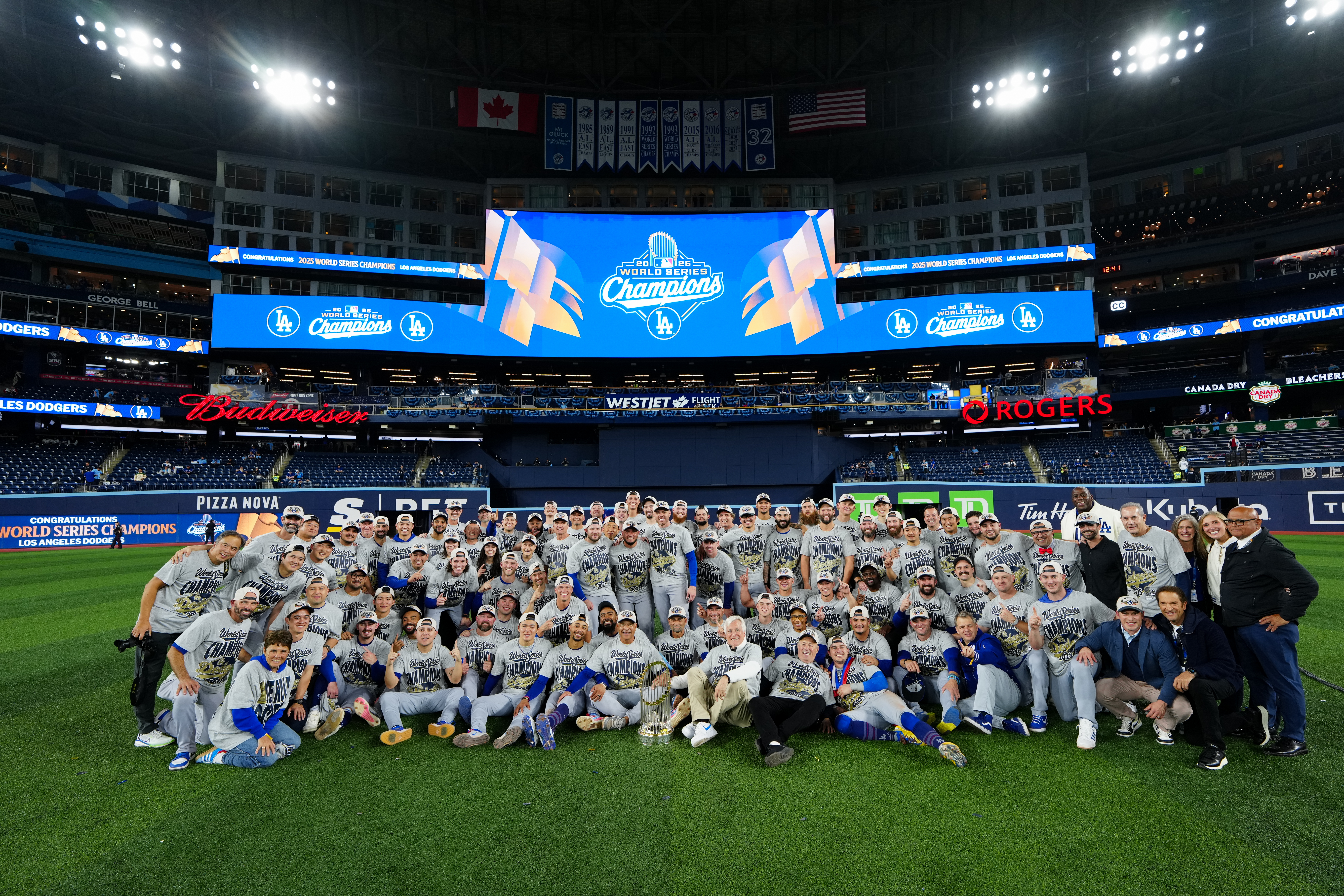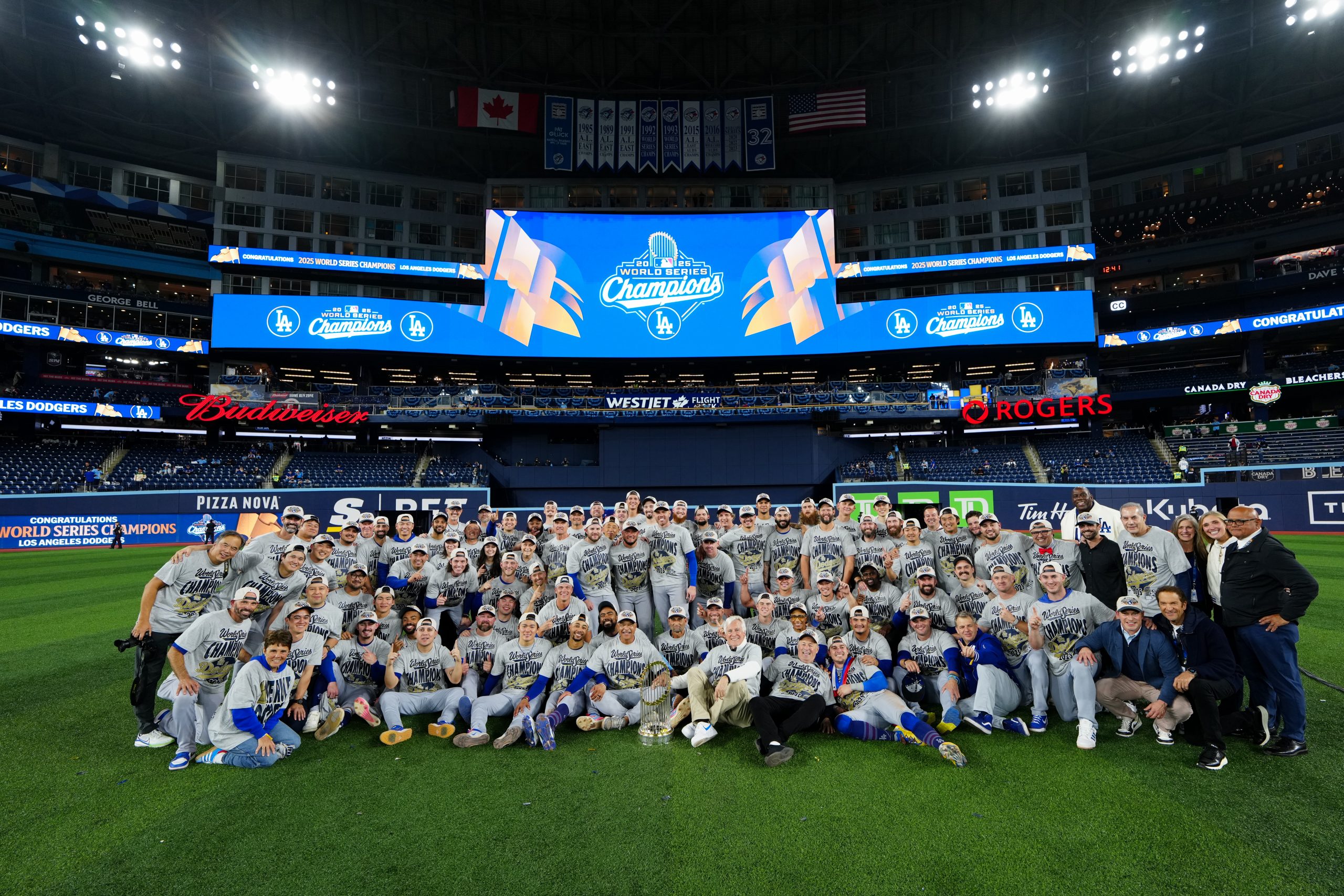
Baseball has a way of immortalizing its most dramatic nights. The nights when time slows, hearts race, and a season’s worth of dreams balance on the edge of a single swing. Saturday night at Rogers Centre was one of those nights — a masterpiece painted in tension and redemption, where the Los Angeles Dodgers completed one of the greatest comebacks in World Series history, outlasting the Toronto Blue Jays 5–4 in 11 innings to capture their third World Series title in six years.
But how did they do it? Down 3-2 in the series on the road, they were out-hit, out-pitched, out-played and the scoreboard reflected that. Over the course of the seven games, Toronto had a total of 34 runs on 75 hits, compared to just 26 runs and 53 hits for the Dodgers.
The Blue Jays should have won the series by lengths and bounds, but the story of the series— and perhaps this dynasty — can be told in five unforgettable plays from Game 7.
1. Max Muncy’s Home Run That Meant More Than It Seemed
It was the top of the eighth. The Dodgers trailed 4–2, and Rogers Centre shook like an earthquake. The city, the country, perhaps most of the planet were counting down outs until Toronto were crowned as the new champions of the world.
Then came Max Muncy — quiet, composed, eyes set on destiny. With one mighty swing, he sent a fastball soaring high of the flashing sign in the second deck. The solo home run barely seemed consequential at the time, trimming the deficit to one. But in hindsight, it was the spark that reignited a dugout on the brink.
A two-run lead feels safe. A one-run lead feels mortal. That subtle shift in pressure — that breath of belief — changed everything.
2. Miguel Rojas: The Unlikeliest of Heroes
There are moments when baseball chooses its heroes, and on this night, it chose Miguel Rojas.
Down to their final two outs, facing Toronto’s closer Jeff Hoffman, Rojas turned on a 2–2 pitch and launched it deep to left. The ball carried, carried, and then — gone. A game-tying home run that left fans and even Dodgers manager Dave Roberts rubbing their eyes in disbelief.
But Rojas wasn’t done. In the bottom of the ninth, with the bases loaded and one out, he fielded a screaming grounder and fired home. Catcher Will Smith stretched just far enough, his toe grazing the plate a fraction of a second before the runner’s foot. The call stood. The game lived on.
Rojas had tied it. Then he had saved it.
3. Andy Pages’ Collision Catch That Saved the Season
Moments later, with the Blue Jays threatening again, destiny tested the Dodgers’ resolve. Andy Pages — inserted as a defensive replacement just one batter earlier — sprinted deep into center field on a ball crushed toward the warning track. On a dead sprint, he collided with Kiké Hernández, somehow held onto the ball, as his teammate crashed to the ground in a tangle of limbs and adrenaline.
It was chaos. It was courage. It was a season-saving catch that sent the game — and a stadium full of gasping fans — into extra innings.
4. Will Smith’s 11th-Inning Blast Heard Around the World
The Dodgers’ catcher had been steady all series, but his moment came in the 11th. Facing Shane Bieber, Smith dug in and delivered the swing that will echo through franchise lore — a towering solo home run that gave Los Angeles a 5–4 lead and sent the Dodger dugout into a frenzy.
It wasn’t just the go-ahead hit. It was the punctuation mark on a relentless belief that this team — no matter how battered, no matter how late — never truly dies.
5. Yamamoto’s Legendary Finish
Then came Yoshinobu Yamamoto — the quiet assassin with a will of iron. Less than 24 hours after throwing 96 pitches in a Game 6 masterpiece, he emerged from the bullpen on no rest, chasing something greater than logic: legacy.
For 2⅔ innings, he bent but never broke. He escaped a bases-loaded jam in the ninth, then induced the game-ending double play in the 11th — a broken-bat roller off Alejandro Kirk’s bat that found the glove of Muncy at third. One throw to second. One turn to first.
Ballgame.
The Dodgers poured onto the field as Yamamoto sank to his knees. The legend of Yoshi was complete.
A Dynasty Defined
With that final out, the Dodgers didn’t just win a championship — they solidified an era. Three titles in six seasons. Two straight World Series crowns. A team built on resilience, depth, and the unshakable belief that history is theirs to write.
For Yamamoto, it was a performance that placed him in rarefied air — the first pitcher since Randy Johnson in 2001 to pitch in back-to-back games of a World Series after a six-inning start. He finished 3–0 with a 1.02 ERA, the kind of postseason line that lives forever in highlight reels and barroom debates.
And for the Dodgers, it was a night of poetic symmetry — one home run to start the comeback, another to finish it, and a cast of heroes that stretched from veterans like Muncy to bench players like Rojas.
They say dynasties aren’t built in a day. But sometimes, they’re immortalized in one.
Saturday night in Toronto was that night — when the Dodgers, against all odds, rose once again from the edge of defeat and reminded the world that their era isn’t ending anytime soon.

Allison Craig is a passionate sports writer and analyst with a deep love for game strategies, player performances, and the latest trends in the sports world. With years of experience covering football, basketball, tennis, and more, she delivers insightful analysis and engaging content for sports enthusiasts.


No responses yet